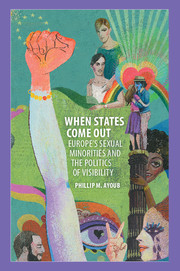Book contents
- Frontmatter
- Dedication
- Contents
- List of figures
- List of tables
- Preface and acknowledgments
- List of abbreviations
- 1 Introduction
- 2 The politics of visibility and LGBT rights in Europe
- 3 Transnational movement: Opportunities, actors, and mechanisms
- 4 Complying with new norms: LGBT rights legislation
- 5 Internalizing new norms: Attitudes toward sexual minorities
- 6 Poland and Slovenia's responses to international norms
- 7 Visibility in movement and transnational politics
- Methodological appendix
- References
- Index
- Books in the Series (continued from p. iii)
Preface and acknowledgments
Published online by Cambridge University Press: 05 May 2016
- Frontmatter
- Dedication
- Contents
- List of figures
- List of tables
- Preface and acknowledgments
- List of abbreviations
- 1 Introduction
- 2 The politics of visibility and LGBT rights in Europe
- 3 Transnational movement: Opportunities, actors, and mechanisms
- 4 Complying with new norms: LGBT rights legislation
- 5 Internalizing new norms: Attitudes toward sexual minorities
- 6 Poland and Slovenia's responses to international norms
- 7 Visibility in movement and transnational politics
- Methodological appendix
- References
- Index
- Books in the Series (continued from p. iii)
Summary
Like many students of social movements, I first became interested in the LGBT rights movement through personal experience. This project dates back to 2004–2006, when I was completing a master's degree in Berlin at a time when many Berliners were organizing to participate in marches for LGBT equality in various Polish cities. It was in Berlin that I came across a flier concerning a march in Warsaw, which sparked a long curiosity about the transnational nature of LGBT politics and the questions it raises. The political behavior that seemed obvious to many of the participants challenged fundamentals of what I had learned of politics in the classroom: what was rational about marching for rights in a foreign context, where such rights would not benefit you directly? Why did such activism meet forceful resistance in some cases and not in others? The uneven diffusion of legal rights and societal recognition across states – the goals of the movement – also puzzled me.
During the decade I spent thinking about the issues related to this book, I would be amazed most of all by the striking changes that occurred around the globe. Under the right conditions, it seemed, LGBT people could be their own emancipators (in some sense of that word), in that their visibility could be the path toward rights. Moreover, these politics of visibility were transnational in nature, as so many varied states – including ones that many observers thought of as highly unlikely – adopted new LGBT rights norms into the framework of the state. The contentious politics of visibility thus became the subject of this endeavor, and this book is about the political power of coming out for individuals, groups, and states. It is a story of how local activists can channel transnational support to affect domestic politics, a story about how a norm can become salient, and about how people can come out under broader conditions of visibility.
For all the words in this book, I could easily devote as many to thanking the various people who have made it possible. It is only fitting that I begin by thanking the many unnamed activists who offered me their time and insight as interviewees.
- Type
- Chapter
- Information
- When States Come OutEurope's Sexual Minorities and the Politics of Visibility, pp. xiii - xviiiPublisher: Cambridge University PressPrint publication year: 2016



